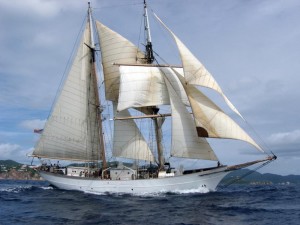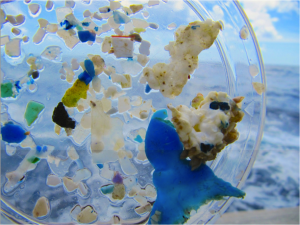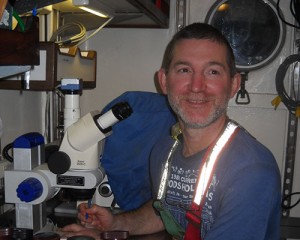In the spring of 2015, Helena McMonagle, a college student, collected samples for her Sea Semester project in the middle of the North Atlantic Ocean. With fine meshed plankton nets, she trawled the top of the ocean. But with the plankton came the unexpected.
“I was so surprised to be in a place that seemed so remote and so pristine. But then you pull up this plankton net and there is plastic in there and evidence of human waste. It was really shocking how much plastic we found.”
For the past 45 years, Sea Semester (SEA) has been training the next generation of oceanographers about marine environmental issues by getting them out of the classroom and onto the ocean. Integral to Helena’s experience was one of her mentors, Dr. Erik Zettler. A recently retired Sea Semester professor and current researcher with SEA in Woods Hole, Massachusetts, Dr. Erik Zettler has been pivotal in research on marine plastic debris. Utilizing the research power of undergraduates, Dr. Zettler has investigated the living communities whose homes are on our plastic. He calls these plastic communities the “Plastisphere.”
These communities may be small, but they have large and devastating impacts. These pieces of plastic transport harmful creatures as they drift in the ocean’s currents, including human pathogens and algae responsible for toxic red algae tides.
With about eight million tons of plastic entering the oceans every year– the equivalent of two empire state buildings every month– the fate of this plastic and its consequences are worth investigating.
For 22 years, Dr. Zettler has investigated microbial communities, focusing on the Plastisphere in the past decade. Before working for Sea Semester, he was a research technician at Woods Hole Oceanographic Institution. He was attracted to SEA by their boats docked right across the street. Sea Semester is known for their two sailboats, which look like relics of the 1700s with their huge white sails and two masts. In fact, they are sophisticated research vessels.

Sea Semester boat. Photo credit: https://syr-sa.terradotta.com/index.cfm?FuseAction=programs.ViewProgram&Program_ID=10287
Dr. Zettler realized Sea Semester was a perfect match when he got the opportunity to travel with them on a short research trip. “I absolutely loved it. It was a combination of everything I like,” he reminisced with a smile during our Skype conversation. “It’s fieldwork on a sailing boat, high quality science, and teaching. Three things I really enjoy in one, ” he said counting each aspect on a finger. When a permanent position became available in 1994, he joined Sea Semester full time.
Since his first ocean research voyage, Dr. Zettler has spent up to one-third of every year at sea doing research. But, he still depends a lot on student research. “All of my research at SEA pretty much was done through student research projects,” Dr. Zettler said appreciatively. “Essentially they’re acting as research assistants.” At SEA, students like Helena McMonagle help with ideas, processing and analyzing the samples, and collecting data.
“They treated us like colleagues,” Helena described of her time working with Dr. Zettler and his wife, Dr. Amaral-Zettler. “It was empowering.” And it is easy to see why his students respected him so much.
During our Skype conversation, Dr. Zettler was modest and friendly, seeming more like an engaging professor and sea-weathered researcher in his blue fleece and wire-rimmed glasses, than a renowned researcher. He has worked on more than 30 published papers, including a 2015 paper that was featured in the Falmouth Enterprise, a local Massachusetts paper.
The paper discussed policy implications of the Plastisphere, the composition of which Dr. Zettler and other Woods Hole based researchers discovered is dependent on its location. Plastics in the North Atlantic Ocean had different organisms, like disease causing pathogens, living on them than in the North Pacific Ocean. This is an important discovery because it means that plastic debris might have site-specific effects on the environment and marine organisms that accidentally ingest the plastic. Political efforts to mitigate the impacts of marine plastic debris will require equally regionally specific efforts.
Dr. Zettler clearly loves the research he does, but he also highlighted the importance of policy in bridging the divide between science and change—a bridge this 2015 paper starts to build.
“You have to stop plastic at the source, which is land,” he emphasized, when I asked what we must do now to solve our marine plastic debris problem. He stressed the importance of minimizing the use of single-use plastic. Single-use plastics are about half of the 300,000,000 million tons of plastic created every year, and some of it can be replaced by biodegradable materials, which can be industrially composted. Examples of policies that minimize single-use plastics include plastic bag bans and fees.
Stopping plastic at its source is especially important because researchers don’t know where most of the plastic is ending up once it gets into the ocean. “We are putting in eight million tons of plastic every year, but when we try to count the plastic that’s floating, we find only 300,000 tons” Dr. Zettler said. That’s like the weight of 20 empire state buildings going missing every year. This means that marine plastic debris may be having other unknown effects on oceanic ecosystems.
With the help of Sea Semester student research, maybe Dr. Zettler will solve that mystery. For now, he continues to lay the foundation for future policy that will alleviate our ocean’s plastic pollution crisis and impacts of the Plastisphere.

